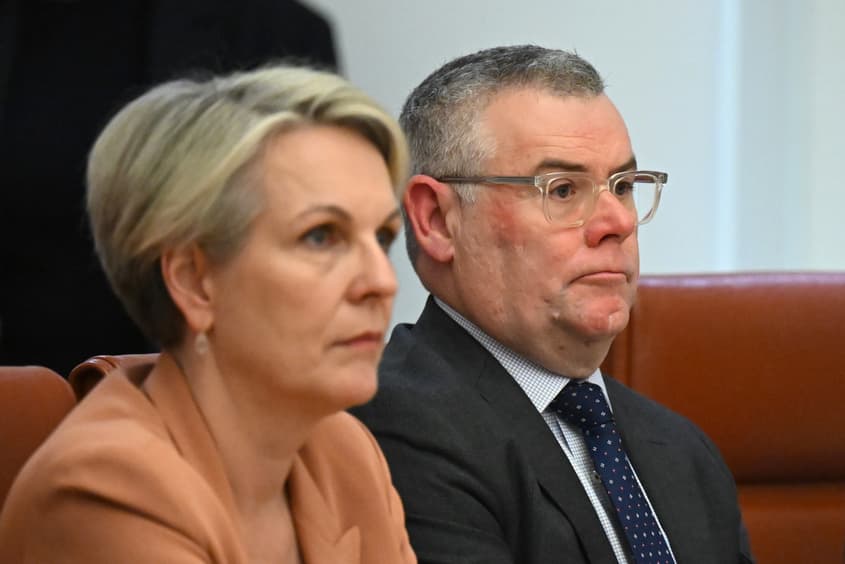Why did Australia, the world’s second-largest exporter of fossil fuels by emissions, want to host COP?
Sun 23 Nov 2025 00.00

Australian Environment Minister Murray Watt listens to Australian Prime Minister Anthony Albanese speak during a Cabinet meeting at Parliament House in Canberra, Monday, May 26, 2025. (AAP Image/Lukas Coch) NO ARCHIVING
Last week Australia dropped its bid to co-host the 31st United Nations COP.
In technical terms, it’s the United Nations Framework Convention on Climate Change (UNFCCC) Conference of the Parties (COP). In less technical terms, it’s the world’s biggest meeting to discuss and agree on future climate action.
Why did Australia, which is the world’s second-largest exporter of fossil fuels by emissions, want to host a conference about climate change? Was it because of a genuine change of heart towards a fossil-free future for the planet? Did we walk the walk?
In short: No.
Throughout Australia’s 3-year bid to host COP, we continued to expand our already massive fossil fuel extraction operations, putting the Pacific – our prospective cohosts – in existential peril.
November 2022 – the bid begins
Australia announced its bid to co-host COP31 on 5 November 2022. Notably, this bid would not be Australia’s alone, but “in partnership with our Pacific neighbours”, because, according to Climate Change Minister Chris Bowen, “nothing is more central to the security and economies of the Pacific than climate change”.
The announcement was met with a mix of hope and scepticism from environmental groups. Greenpeace, for example, argued that Australia had to “earn the right to co-host COP31 with the Pacific”, welcoming the bid as long as it was “matched with real action on climate”.
May 2023 – Australia approves four new coal mines
On 11 May 2023, Environment Minister Tanya Plibersek quietly gave a nod to four new coal mines. Opening any new coal mines is inconsistent with achieving the global target of net zero emissions by 2050, according to the International Energy Agency.
November 2023 – Pacific elders demand Australia urgently phase out coal and gas
On 2 November 2023, The Pacific Elders’ Voice, whose members include former prime ministers, presidents and ministers from Pacific island nations, called on Australia to urgently phase out coal and gas emissions if it wanted to host COP31.
May 2024 – The Pacific calls for a Fossil Fuel Non-Proliferation Treaty
On 26 May 2024, 12 Pacific nations attended the first ministerial meeting of the Fossil Fuel Non-Proliferation Treaty Initiative, proposing a new treaty for an equitable transition away from oil, gas and coal. This was a strong signal to Australia – the Pacific would not accept business as usual on coal and gas.
December 2024 – Australia approves another four coal mines
On 19 December 2024, Environment Minister Tanya Plibersek claimed that no new coal mines had been approved that year. That was despite the Federal Government approving four coal mine extensions that year. Combined, they’ll result in more than 900 million tonnes of carbon emissions over their lifetimes (or about twice what Australia produced from all sources in 2023).
May 2025 – Labor approves North-West Shelf gas extension
On 31 May 2025, fresh off the heels of a landslide election win, new Environment Minister Murray Watt approved the North West Shelf gas project to last until 2070 – the emissions equivalent of building 12 new coal power stations.
September 2025 – Vanuatu warns North-West Shelf extension may be illegal
On 11 September 2025, Vanuatu’s climate and energy minister warned Australia that its approval for the North West Shelf project could breach the International Court of Justice’s ruling that states can be held legally liable for the damage caused by their greenhouse gas emissions.
November 2025 – Australia concedes hosting rights to Türkiye
After years of negotiation and planning, Australia finally conceded the right to host COP31 to Türkiye on 20 November 2025, reaching an agreement to host negotiations before the conference.
Over the three years of Australia’s failed COP bid, the Federal Government has approved 11 new coal mines and expansions, which will collectively release 1.7 billion tonnes of lifetime emissions, and another 2.3 billion tonnes from gas approvals.
While Australia’s COP31 was billed as an opportunity to highlight the struggles of the Pacific, the failed campaign acted as a smokescreen for Australia’s continued abuse of the planet’s climate, which threatens to bury Pacific Island countries beneath the waves.
